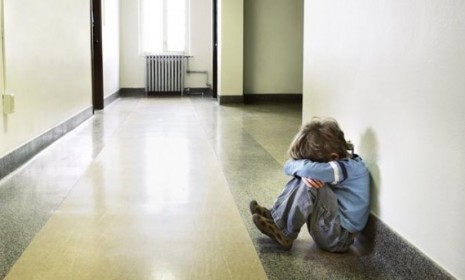Why some 7-year-old kids are cutting themselves
Researchers say even young children may resort to hurting themselves if they haven't learned how to properly deal with stress and frustration

A free daily email with the biggest news stories of the day – and the best features from TheWeek.com
You are now subscribed
Your newsletter sign-up was successful
A new study published in the journal Pediatrics found that children as young as 7 are cutting, burning, or hitting themselves as a way to deal with emotional pain. Researchers say that parents usually have no idea about the self-torture because their children tend to injure themselves behind closed doors. What's behind this sobering discovery? Here, a brief guide:
How did researchers discover this?
They looked at 655 kids from central New Jersey and Denver, ranging in age from 7 to 16. Ninth graders were the most likely to say they had tried to physically hurt themselves, with 12.7 percent saying they had engaged in what the researchers called "non-suicidal self-injury." Nearly 8 percent of third graders said they had done it at least once, and children as young as 7 had tried it, too. "A lot of people tend to think that school-aged children, they're happy, they don't have a lot to worry about," study author Dr. Benjamin Hankin tells Reuters. "Clearly a lot more kids are doing this than people have known."
The Week
Escape your echo chamber. Get the facts behind the news, plus analysis from multiple perspectives.

Sign up for The Week's Free Newsletters
From our morning news briefing to a weekly Good News Newsletter, get the best of The Week delivered directly to your inbox.
From our morning news briefing to a weekly Good News Newsletter, get the best of The Week delivered directly to your inbox.
Why do kids do this?
Children tend to injure themselves as a coping mechanism when they're extremely angry, frustrated, or under tremendous stress, counselors say. "You can have young kids who are experiencing a lot of emotions, things that they don't know how to deal with it," says Hankin, an associate psychology professor at the University of Denver, "so they start banging their head against the wall."
What signs should adults look for?
Parents and teachers often have to do some investigation to uncover the problem. Young kids might not be able to hide bruises, but older ones might cover them up with long sleeves, which can be a telltale sign in summer weather. If older children dodge direct questions, parents should be on the lookout for sleep problems, mood changes, altered eating habits, and other behavior that can indicate trouble beneath the surface. Self-injuring can also cause a child's performance in school and relationships to suffer.
A free daily email with the biggest news stories of the day – and the best features from TheWeek.com
What can parents do to help?
If you spot a problem, remain calm, says child psychologist Alec Miller. "The worst thing you can do is be judgmental and angry," he says. "Parents have to be very careful; otherwise, the kid will go further underground and conceal it more." If a kid does something mild, such as punching a wall in anger, parents should have a talk with him or her, says pediatric psychologist Dr. Steve Pastyrnak. But if the behavior worsens to cutting, burning, or repeated hitting, he says, consult a mental-health professional.
Sources: ABC News, Baby Center, CBS News, Mommyish, Reuters